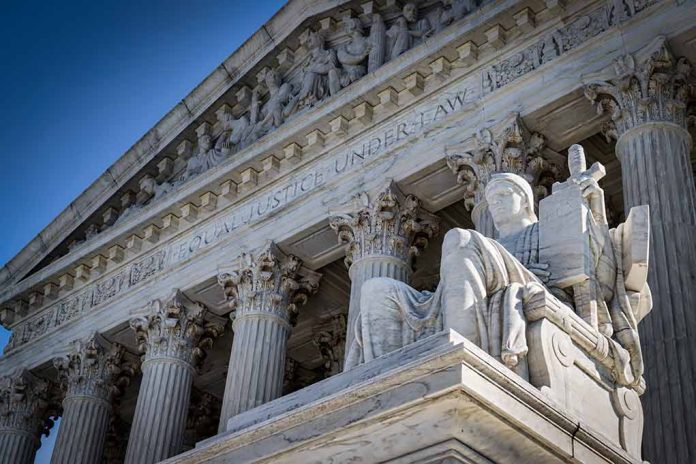🔴 Website 👉 https://u-s-news.com/
Telegram 👉 https://t.me/usnewscom_channel
The Supreme Court sabotages President Trump’s long-awaited deportations of Venezuelan criminals with an unprecedented midnight decree that even shocked conservative Justices Alito and Thomas.
At a Glance
- The Supreme Court has halted deportations of Venezuelan migrants under the Alien Enemies Act of 1798, a rarely invoked wartime law
- Justice Samuel Alito, joined by Justice Thomas, issued a blistering dissent calling the court’s action “unprecedented and legally questionable”
- The court’s order came “literally in the middle of the night” without input from lower courts or hearing from the opposing party
- The ACLU filed an emergency appeal arguing deportations had resumed with insufficient due process
- Even Trump-appointed Justices Brett Kavanaugh and Amy Coney Barrett signed off on blocking the deportations
Midnight Judicial Activism Derails Border Security Efforts
In a stunning blow to President Trump’s efforts to secure our border, the Supreme Court has temporarily blocked the administration from deporting Venezuelan migrants accused of gang membership. The court’s unsigned order prevents the use of the Alien Enemies Act of 1798, a law designed to protect Americans during wartime that the administration had lawfully invoked. The decision specifically halts deportations of Venezuelans being held at Texas’ Bluebonnet Detention Center, despite the administration’s clear authority to remove these individuals who pose threats to American communities and drain taxpayer resources.
Justice Samuel Alito did not mince words in his powerful dissent, joined by Justice Clarence Thomas. The timing and process of this decision reveal a troubling pattern of judicial overreach designed to hamstring the President’s immigration enforcement. The fact that even Trump-appointed justices Kavanaugh and Barrett signed onto this order raises serious questions about their commitment to the constitutional principles they were appointed to uphold. This is precisely the kind of unelected bureaucratic obstruction that millions of Americans voted against in November.
Unprecedented Judicial Interference
Justice Alito’s dissent highlighted the exceptional and problematic nature of the court’s intervention. “In sum, literally in the middle of the night, the court issued unprecedented and legally questionable relief, without giving the lower courts a chance to rule, without hearing from the opposing party, within eight hours of receiving the application, with dubious factual support for its order, and without providing any explanation for its order,” wrote Justice Samuel A. Alito Jr. in his scathing dissent. This hasty decision-making undermines proper judicial process and represents an alarming overreach that directly interferes with executive authority on immigration enforcement.
The court’s order specifically directed the Trump administration not to remove any Venezuelans from Bluebonnet Detention Center “until further order of this court.” This indefinite pause comes after the American Civil Liberties Union — predictably — filed an emergency appeal claiming deportations had resumed without adequate due process. The timing couldn’t be more suspect, as President Trump’s administration has been making significant headway in addressing the catastrophic border crisis left by the previous administration. Every day these deportations are delayed means more American communities remain at risk.
The 226-Year-Old Law at the Center of the Controversy
The Alien Enemies Act of 1798 allows for the deportation of citizens from hostile nations without typical hearing requirements. This law has been rarely invoked, most recently during World War II, but remains a valid tool for presidents facing national security threats. The Trump administration appropriately determined that Venezuelan gang members pose precisely the kind of danger this law was designed to address. Yet the Supreme Court has called this into question, despite previously allowing limited deportations under the Act provided due process was observed — a standard the administration had met.
“hastily and prematurely granted.” Justice Samuel A. Alito Jr.
The administration’s counsel had already filed an opposition to the order, explaining that detainees were given advance notice to file habeas claims, and the government agreed not to remove those who filed such claims. This reasonable approach balanced national security concerns with legal rights, yet the court disregarded these assurances in favor of a blanket halt. The court’s decision seems designed to hamstring effective immigration enforcement at a time when Americans are demanding stronger border security against the tidal wave of illegal immigration that has swamped our country for years.
The Real-World Impact of Judicial Obstruction
While the Supreme Court deliberates, American communities continue to bear the brunt of the illegal immigration crisis. Each day that criminal aliens remain in our country represents another day that American citizens face unnecessary risks and taxpayers shoulder the financial burden of their detention. The Alien Enemies Act provides a legal pathway to address specific threats to national security, yet activist judges have once again placed theoretical legal concerns above practical safety considerations that affect everyday Americans.
President Trump’s administration has consistently sought to use every legal tool available to protect American sovereignty and security. The judicial roadblocks being thrown up against these legitimate efforts represent exactly the kind of swamp resistance that the American people rejected at the ballot box. As this case continues through the courts, it serves as a stark reminder of why judicial appointments matter and why the separation of powers must be respected — especially when it comes to the President’s constitutional authority over immigration and national security.

